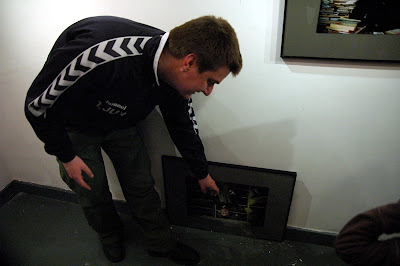07 April 2009
06 April 2009
05 April 2009
04 April 2009
03 April 2009
Everlasting moments

A few weeks ago I went to the cinema and saw a wonderful movie called Maria Larsson's Everlasting Moments by director Jan Troell. It's about a young working class woman in the city of Malmö, Sweden, during the early 20th century. She wins a camera on a lottery and starts to develop a passion for photography and begins to explore new ways of seeing.
When I got home from the cinema I came to think about some glassplates that I bought at a garage-sale in Dalecarlia. After looking through a lot of boxes I finaly found them and here they are. (If you're in to the history of cloathing maybe you can help me with their age.)
Btw, I highly recommend the movie.









meeting with Alex Majoli / soon
March 09 Fblog had a conversation with Alex Majoli. Stay tuned for the interview! Alex Majoli /born 1971/. Italian photographer. From 1996 in Magnum. One of the youngest in the agency. Books, exhibitions, projects, etc...these most important:
Alex Majoli /born 1971/. Italian photographer. From 1996 in Magnum. One of the youngest in the agency. Books, exhibitions, projects, etc...these most important:
Leros, One Vote, France05 Marseille for Euromed, and several more.
02 April 2009
31 March 2009
30 March 2009
28 March 2009
26 March 2009
face to the frame with Tomek Adamowicz




 you know pictures by Tomek Adamowicz. here are some pics from the exhibition "Warsaw - faces of the city" in Green Gallery in Warsaw/
you know pictures by Tomek Adamowicz. here are some pics from the exhibition "Warsaw - faces of the city" in Green Gallery in Warsaw/
it's also a tutorial - how not to act in the opening nights...
nobody was harmed. uff!
congrats!
25 March 2009
Mario Giacomelli at Atlas/London
 Mario Giacomelli, Puglia 1957©Rita Giacomelli, Archivio Mario Giacomelli – Sassoferrato
Mario Giacomelli, Puglia 1957©Rita Giacomelli, Archivio Mario Giacomelli – Sassoferrato Mario Giacomelli, Puglia 1957©Rita Giacomelli, Archivio Mario Giacomelli – Sassoferrato
Mario Giacomelli, Puglia 1957©Rita Giacomelli, Archivio Mario Giacomelli – Sassoferrato
Mario Giacomelli – Puglia
from today till 16 May 2009 at Atlas Gallery / London.
Widely regarded as the greatest Italian photographer of the twentieth century, Mario Giacomelli was born in Senigallia, Italy, in 1925. Following a poor formal education, he began his working life as a jobbing printer, before training as a typographer and did not fully embrace photography until he was 30 years old. Despite this late start and his sometimes unconventional almost naïve approach, and in some ways because of it, Giacomelli is now considered one of the most original photographic artists of the twentieth-century. The combination of his experimental working methods with the sometimes brutal imagery of his subject matter create a very personal, but playful and poetic exploration of the region in which he lived his life.
Giacomelli’s initial inspiration came from the gritty and grainy post-war Neo-Realist films of Rossellini and De Sica and also from the graphic effects and calligraphic line he had used in printing. He continued to work in, and later run, a print shop in Senigallia throughout his adult life. Above all, Giacomelli saw himself as a poet with a camera. His love of written poetry too was to become the principal source of his (self-) education, allowing him the freedom to build meaning into his work and helping him mask the feelings of inadequacy that a poor schooling had left. The exhibition includes original manuscripts of poems alongside the prints, emphasizing the very strong link he felt between these two media.
“Photography is not difficult, as long as you have something to say”. Giacomelli’s famous statement underlines his casual disregard for the technical intricacies of the photographic process. Once he was given a new camera with an exposure meter, but threw it away in favour of his simple point-and-shoot model. This rawness of approach is a key characteristic of his work and his obliviousness to accepted dark-room practices resulted in the creation of works which were completely unique in style.
Giacomelli’s work in Puglia in 1957 is one of his most celebrated series. He later wrote: “to look at these images…is to feel the surface texture of plants, to know the labour of the land, the sounds of celebration, the games outside the church, old sun-drenched walls, friendship and human company, quiet relaxation, the events, the ceremonial and religious life, the pride and vitality that are the visible phenomena of society.” The photographs depict an almost idealistic fantasy of how we today imagine the Italian village to look. The prints themselves display Giacomelli’s characteristic use of strong contrast and striking use of form and texture.
All the prints in this exhibition come directly from his estate in Sassoferrato, Italy, and were made by the photographer in his dark room, which still remains undisturbed, since his death in 2000, along with all his possessions at his house in Senigallia. Also included are some of his most well-known works from the series Io Non Ho Mani Che Mi Accarezzino il Volto (There are no Hands to Caress My Face), in which young priests are shown joking with each other in the snow, along with a selection of his landscapes.
Giacomelli won numerous medals and prizes, and achieved international status through exhibitions in Europe, America and Japan. His works are held in museums, corporate and private collections worldwide.
 Mario Giacomelli in his studio ©Paolo Mengucci, 1997
Mario Giacomelli in his studio ©Paolo Mengucci, 1997delivered to Fblog by joanna, as a part of the F-week from Italy. stay tuned for more!
23 March 2009
Invited guest: Jens Olof Lasthein
I'm glad to be able to show some of the photos here on the F Blog. If you want to see more, have a look at his website or better yet, buy the wonderful book that was nominated one of five candidates as Photo book of the year 2008 in Sweden.
/markus



































